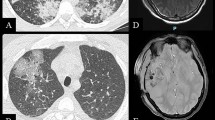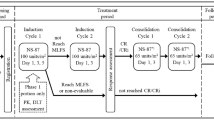Abstract
Ten percent to 20% of patients with Hodgkin Lymphoma (HL) are refractory to first-line therapy or relapse. Existing salvage regimens have response rates of 60–85%, considerable toxicity and frequent treatment delay or dose reduction. We report a gemcitabine, cisplatin, and dexamethasone regimen (GemCis) with intensive growth factor and platelet support and no treatment delay. Seventeen patients with relapsed or refractory biopsy proven HL were treated. Toxicity, transfusion requirement, stem cell harvesting and engraftment data were collected. Response assessment was by computed tomography and positron emission tomography. Overall and complete response rates were high (94% and 65%, respectively). There were no episodes of febrile neutropenia, treatment delays or hospital admissions. All 15 patients intended for autograft were successfully harvested. All engrafted successfully with a median time for the entire group to neutrophil engraftment of 14 days. With a median follow-up of 22 months, the median survival has not yet been reached, and the estimated 2-year survival is 88%. GemCis is a well-tolerated outpatient regimen for relapsed/ refractory Hodgkin lymphoma which does not inhibit stem cell mobilisation, gives excellent response rates and compares favourably with previously published salvage regimens using these or other chemotherapy agents.

Similar content being viewed by others
References
Duggan DB, Petroni GR, Johnson JL et al (2003) Randomized comparison of ABVD and MOPP/ABV hybrid for the treatment of advanced Hodgkin’s disease: report of an intergroup trial. J Clin Oncol 21:607–614. doi:10.1200/JCO.2003.12.086
DeVita VT Jr, Hubbard SM (1993) Hodgkin’s disease. N Engl J Med 328:560–565. doi:10.1056/NEJM199302253280808
Aparicio J, Segura A, Garcera S et al (1999) ESHAP is an active regimen for relapsing Hodgkin's disease. Ann Oncol 10:593–595. doi:10.1023/A:1026454831340
Akhtar S, El Weshi A, Abdelsalam M et al (2007) Primary refractory Hodgkin's lymphoma: outcome after high-dose chemotherapy and autologous SCT and impact of various prognostic factors on overall and event-free survival. A single institution result of 66 patients. Bone Marrow Transplant 40:651–658. doi:10.1038/sj.bmt.1705792
Brice P (2008) Managing relapsed and refractory Hodgkin lymphoma. Br J Haematol ▪▪▪:3–13. doi:10.1111/j.1365-2141.2008.06998.x
Santoro A, Bredenfeld L, Devizzi L et al (2000) Gemcitabine in the treatment of refractory Hodgkin’s disease: results of a multicentre phase II study. J Clin Oncol 18:2615–2619
Santoro A, Magagnoli M, Spina A et al (2007) Ifosfamide, gemcitabine and Vinorelbine: A new induction regimen for refractory and relapsed Hodgkin’s lymphoma. Haematologica 92:35–41. doi:10.3324/haematol.10661
Baetz T, Belch A, Couban S et al (2003) Gemcitabine, dexamethasone and cisplatin is an active and non-toxic chemotherapy regimen in relapsed or refractory Hodgkin’s disease: a phase II study by the National Cancer Institute of Canada Clinical Trials Group. Ann Oncol 14:1762–1767. doi:10.1093/annonc/mdg496
Chau I, Harries M, Cunningham D et al (2003) Gemcitabine, cisplatin and methylprednisolone chemotherapy (GEM-P) is an effective regimen in patients with poor prognostic primary progressive or multiply relapsed Hodgkin's and non-Hodgkin's lymphoma. Br J Haem 120:970–977. doi:10.1046/j.1365-2141.2003.04226.x
Waters J, Chau I, Norman AR et al (2004) Gemcitabine (GEM), cisplatin (P) and methylprednisolone: A salvage regimen in relapsed Hodgkin's disease and non-Hodgkin's lymphoma. J Clin Oncol 22(14S):6589 2004 ASCO Annual Meeting Proceedings (Post-Meeting Edition)
Ng M, Waters J, Cunningham D et al (2005) Gemcitabine, cisplatin and methylprednisolone (GEM-P) is an effective salvage regimen in patients with relapsed and refractory lymphoma. Br J Cancer 92:1352–1357
Popat U, Hosing C, Saliba RM et al (2004) Prognostic factors for disease progression after HDT and ASCT for recurrent or refractory Hodgkin lymphoma. Bone Marrow Transplant 33:1015–1023. doi:10.1038/sj.bmt.1704483
Cheson BD, Pfistner B, Juweid ME et al (2007) Revised response criteria for malignant lymphoma. J Clin Oncol 25:579–586. doi:10.1200/JCO.2006.09.2403
Pfreundschuh MG, Rueffer U, Lathan B et al (1994) Dexa-BEAM in patients with Hodgkin’s disease refractory to multidrug chemotherapy regimens: a trial of the German Hodgkin’s Disease Study Group. J Clin Oncol 12:580–586
Martin A, Fernandez-Jimenez MC, Caballero MD et al (2001) Long-term follow up in patients treated with Mini-BEAM as salvage therapy for relapsed or refractory Hodgkin’s disease. Br J Haematol 113:161–171. doi:10.1046/j.1365-2141.2001.02714.x
Rodriguez J, Rodriguez MA, Fayad L et al (1999) ASHAP: a regimen for cytoreduction of refractory or recurrent Hodgkin’s disease. Blood 93:3632–3636
Ribrag V, Nasr F, Bouhris JH et al (1998) VIP (etoposide, ifosfamide and cisplatinum) as a salvage intensification program in relapsed or refractory Hodgkin’s disease. Bone Marrow Transplant 21:969–974. doi:10.1038/sj.bmt.1701202
Moskowitz CH, Nimer SD, Zelenetz AD et al (2001) A 2-step comprehensive high-dose chemoradiotherapy second-line program for relapsed and refractory Hodgkin disease: analysis by intent to treat and development of a prognostic model. Blood 97:616–623. doi:10.1182/blood.V97.3.616
Josting A, Rudolph C, Reiser M et al (2002) Time-intensified dexamethasone/ cisplatin/cytarabine: an effective salvage therapy with low toxicity in patients with relapsed and refractory Hodgkin’s disease. Ann Oncol 13:1628–1635. doi:10.1093/annonc/mdf221
Canales MA, Fernandez-Jimenez MC, Martin A et al (2001) Identification of factors associated with poor peripheral blood progenitor cell mobilization in Hodgkin's disease. Haematologica 86:494–498
Joint Formulary Committee British National Formulary (2008) Beccles. Pharmaceutical Press, London
Author information
Authors and Affiliations
Corresponding author
Rights and permissions
About this article
Cite this article
Todd, T., Raj, S., Camilleri, D. et al. Intermediate dose gemcitabine–cisplatin combination chemotherapy without treatment delay for cytopenia followed by autografting—a new standard of care in relapsed or refractory Hodgkin lymphoma?. Ann Hematol 88, 1107–1112 (2009). https://doi.org/10.1007/s00277-009-0734-6
Received:
Accepted:
Published:
Issue Date:
DOI: https://doi.org/10.1007/s00277-009-0734-6




